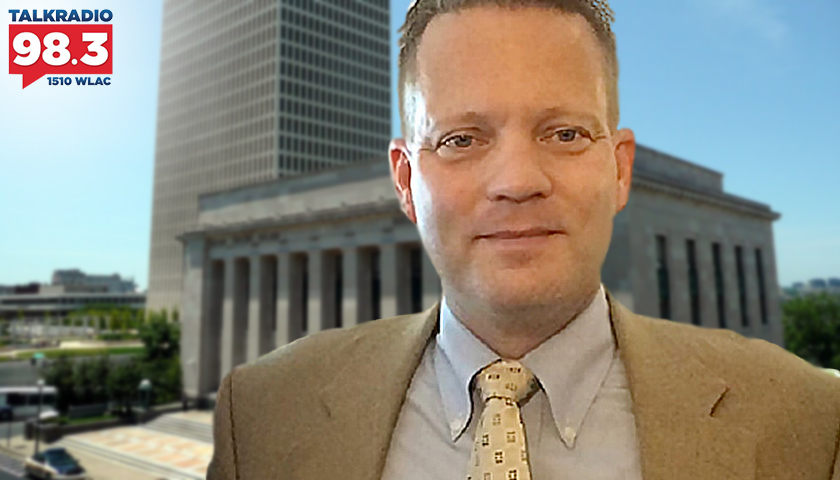Live from Music Row Friday morning on The Tennessee Star Report with Michael Patrick Leahy – broadcast on Nashville’s Talk Radio 98.3 and 1510 WLAC weekdays from 5:00 a.m. to 8:00 a.m. – host Leahy welcomed Nashville based attorney Jim Roberts to the newsmakers line.
During the third hour, Roberts gave details on the status of the Nashville Taxpayer Protection Act referendum making it on the December ballot and the illegal and disingenuous actions of the election committee and Metro government.
Leahy: We are joined now on our newsmaker line by our good friend attorney, Jim Roberts. Good morning, Jim.
Roberts: Good morning, sir. How are you doing on this beautiful day?
Leahy: We’re doing great. So I think you have some news to report about legal actions taken in the Nashville Taxpayer Protection Act referendum issue. Tell us what’s happening.
Roberts: Well, as you probably know and your listeners know, about two weeks ago the election commission voted to hire outside counsel and to sue the 27,000 citizens who had prepared and filed a ballot initiative. They have pretty much been sitting on their hands. And so last night since time was running out we filed or I filed on behalf of 4 Good Government a complaint and chancellery court for mandamus to force the election commission to get off their tail ends and put this measure on the ballot as they’re legally required to do.
Leahy: Well they are legally required to do it. They have a ministerial duty to do that. the Tennessee Supreme Court so ruled in 2004. What happens next?
Roberts: Well, I waited to see if they would actually take action, and I think they just chickened out be honest with you. I think they realize the optics of suing the citizens was a bad move and they decided they would just wait it out. And so their idea was we’ll just do nothing and let the time run out. So we filed a lawsuit.
The next step along with a lawsuit is a motion for an expedited hearing, and really sometime this morning I need to be on the phone talking to the judge’s office. I don’t know which judge has gotten the case yet. To make sure the judge knows about it and get this hearing set. Hopefully, we can get it set Monday or Tuesday of next week. There’s no reason to delay this. People’s rights are being violated. And get this matter measure put to bed and back on the ballot.
Carmichael: So and will it be on the ballot on December fifth, as you had it was stipulated in the ballot and then the petition?
Roberts: That’s what we sued for. Further research has given me the belief that I had already but affirmed the belief that there’s no legal basis to move the state. That they don’t have a right to do that just because they did it doesn’t make this right. And they need to be forced to do what the people told them, one, and also it sets a bad precedent giving the election commission more authority and they really have is probably a bad idea. But they don’t seem to be able to use it well to begin with.
Leahy: Yeah, the Metro Charter is crystal clear on this that the petition prescribes. And that’s a legal term that means, legally sets the date for the election. And you did so for December 5th. And we finally got the election commission administrator to send us the legal justification. And I look I’m not the attorney but you looked at it as well and it’s a smokescreen used to move it to December 15th. That was my take on it. What was yours?
Roberts: So I don’t think there’s any legal basis for it. Unless there is some law out there that allows the election commission to move certain types of elections. And that has to do with recall elections and things like that. But not ballot initiatives. They don’t have that authority and they need to be called out for that.
Leahy: So at the September 25th meeting of the Davidson County election commission, they did two things. They postponed the election to a conditional date of December 15th, which you argue is They didn’t have the authority to do. but they also decided to hire a law firm to file for declaratory judgment in Davidson County chancellery court to basically tell them we think this is illegal. But they haven’t done that yet, have they? They haven’t filed that declaratory judgment have they?
Roberts: No, they didn’t, They took no action. I did get an email from the attorney that they hired and he seemed to think that this cave was would take months to move through the court system. And I’ve been involved in election lawsuits and they take days generally to freeze. even a week at the most because they have such importance. I mean, this is not just about me in any way.
It’s about the fact that 27,000 people signed a petition telling the government to do something, which was really simple – put this on the ballot. They didn’t say they had to do it. I mean about the people still get a chance to vote yes or no on it. But this is really clear. I mean the 27,000 citizens said I want the rest of this city to have a chance to vote on this. nd the election commission doesn’t get to just say we don’t think it’s a good idea or we don’t think they deserve to vote. They don’t have that Authority or that discretion.
Leahy: In essence, they are of denying the voting rights to 27,000 residents of Davidson County.
Carmichael: Well and all the other residents. And all the others.
Leahy: Yeah, all the others. Yeah, very good point.
Roberts: They are denying every single registered voter in this county. They are violating their civil rights. Federal case law is very clear on this. It’s unconstitutional from the United States Constitution to do what they are doing and they simply do not care.
Leahy: So when you have this hearing, Monday or Tuesday whichever judge or chancellor court picks it up, what’s going to happen who will be there? What will you say? And what will the election commission say?
Roberts: Well fortunately my argument is going to be pretty simple. I’m going to hand the judge a copy of the charter. And I will point out that we’ve done everything we’re supposed to do. And I’m going to look at the judge and say now it’s time for you to tell the government to get off the tail end and do their job. I’m waiting to see what Metro is going to say about this. They’re going to hem and haw and they’re going to have a lot to say about it. But in the end, they are failing to do their job because they just simply don’t want to.
Leahy: Now did you sue anybody in it? Or did you just ask the court to rule and hold a hearing?
Roberts: Well technically you can’t really see through the election commission because it’s part of the Metro Government. So you sue the Metropolitan government in general. So they are the defendant in the case. And I think that may have been why they had some trouble deciding what they were going to do. They wanted to follow a lawsuit, but they didn’t really know who to sue. And the only people they could sue would be the 27,000 voters of Davidson County.
Leahy: So in this hearing who will represent the Metro Government. Will they be at this hearing on Tuesday or so with the judge?
Roberts: Oh, I’m sure Bob Cooper and the normal team of lawyers will be there. This isn’t my first election case. And in fact, I suspect it’ll be Laura Fox who is an attorney for Metro. She was on the case I will on 12 years ago. And over this same issue about putting things on the ballot. I suspect they’ll send her back down because she’s experienced at it.
Leahy: What will her argument be?
Roberts: I think her argument will try to be that we think the meaning Metro legal, thinks that somehow this is unconstitutional.
Leahy: That’s a referendum itself is unconstitutional? That’s right. The content.
Roberts: I suspect.
Leahy: But the Tennessee Supreme Court ruled on that in 2004 and said you got no place to make that argument until after the referendum is held.
Roberts: You know that and I know that but apparently Metro legal didn’t get a copy of that opinion.
Leahy: Yeah, I think I got a copy of the opinion.
Roberts: This is disingenuous. You have to understand that unfortunately Metro legal will take the position of whatever the mayor wants whether it’s accurate or not. And it’s been my experience that they play the tune of the piper that for the person who pays them. I mean, it’s just that simple.
Leahy: So after this hearing on Tuesday, you make your case. The lawyer for Metro makes their case. What happens? What does the judge do?
Roberts: Well, the normal language of the judge would issue a mandamus ordering the election commission to meet and to vote and the places on the ballot. I suspect that they will go in there and start claiming that now there’s not enough time. That they can’t do it on the fifth. that they’ve basically messed around and now it’s my fault that I didn’t sue them sooner. That’s what they’re going to argue.
Leahy: Really? That’s what they are going to argue? They could but it’s so ridiculous,
Roberts: But I think they still have time to put it on December fifth. I think there is some lead-up time to do that because this is a single-issue measure. It’s not like putting together the November presidential ballot where you have dozens of races and all these different things. This is one issue.
Leahy: It’s like 56 days from now. So yeah, that’s plenty of time. I think.
Roberts: It is plenty. They should be preparing for it if they’re these folks are competent. They’re going ahead and doing the things that they need to do to be ready for this ballot. I think they know what’s going to be there’s going to be an election. Whether it’s the fifth or the 15th, there’s going to be an election because they have to know they’re wrong. They just don’t care. Metro does not care because they want this off the ballot. They so want your tax dollars that they will say and do anything.
Carmichael: It’s a comment and as a comment to get your comment. In the pure essence of this. This is the city of Nashville the government of Nashville suing its own people. or refusing to follow the law. I mean the battle is between the government and the people.
Roberts: That’s right exactly what the battle is. And the government threatened to sue the people and then I decided to sit on their hands so the people just sued them.
Leahy: Jim Roberts a great attorney a great American and a great Nashvillian. Thanks for being with us.
Roberts: Yes sir. Y’all have a good day.
Listen to the third hour here:
– – –
Tune in weekdays from 5:00 – 8:00 a.m. to the Tennessee Star Report with Michael Patrick Leahy on Talk Radio 98.3 FM WLAC 1510. Listen online at iHeart Radio.
Photo “TN Supreme Court” by Reading Tom. CC BY 2.0.





